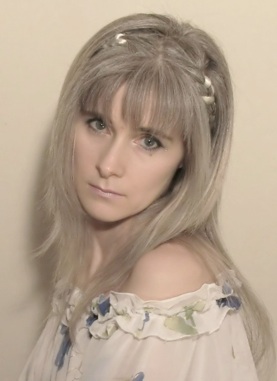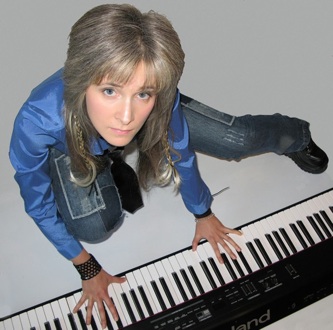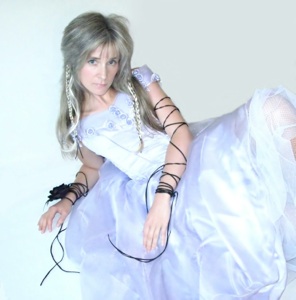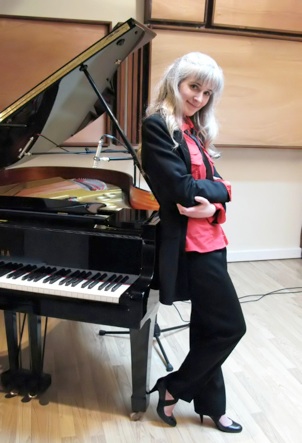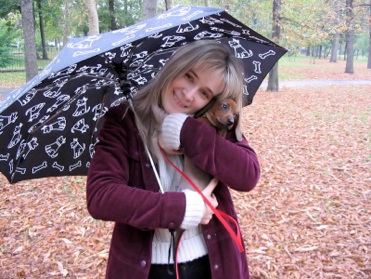Earlier this year, I received an email from an artist in France asking if I would write a review of her new album,
If Only. I took a look at her website, which didn’t give too much information other than she was born in Russia, had been winning piano competitions since she was a child, and is now living in France. I downloaded the album and set it aside for a couple of weeks to catch up on my other work. When I started listening to Galya’s CD, to say I was blown away would be a huge understatement! Magical fingers dance up and down the piano keyboard and her music overflows with emotion and expression. The more I listened to it, the more mesmerizing it became. Needless to say, the album got
a rave review! Still I was very curious about the gentle-looking young woman behind the music and was very happy when she agreed to do an interview. It is my pleasure to introduce you to
Galya!
KP: Where were you born and where did you grow up?
Galya: I was born and grew up in Kharkov, Ukraine close to Russia.
KP: Are any of the other members of your family musicians?
G: I am from a family of several generations of teachers, but my sister (also a professional pianist) and I are the first musicians in our family.
KP: How old were you when you started playing the piano? When did you start piano lessons, and how long did you take lessons?
G: When I was six-years-old, I first made my acquaintance with the piano. It was love at first sight and this crazy love is still going on. When I was seven, I started studying music and piano at a music school for children; then I graduated from music college, and then the University of the Arts, where I received two higher diplomas as a pianist and a composer. For the musician, a diploma does not mean the end of classes. In the life of a musician, pianist, composer there is work every day, both physical and emotional.
KP: Too many people don’t realize that being a full-time musician/composer is more a life-style choice than a career-choice. It has to be part of everyday life. Were you encouraged to improvise or compose by your piano teacher(s) or anyone else?
G: As soon as I first touched the keys and made them sound, I started to improvise. Playing and composing are inseparably linked for me. I have been very lucky in my life with teachers and I’m very grateful to all of them for the knowledge that they shared with me. My main teacher and mentor is Vladimir Zolotukhin. He shared with me not only the knowledge, but most importantly - the heart. He taught me to remain loyal to the music. It was he who showed me that the most important - and most difficult - part is to create a beautiful melody. Music written only by the head and not by the heart is stillborn...
KP: I’m so glad to hear that that philosophy is coming back into teaching at the college level. I’ve talked to so many musicians and composers who dropped out of college music programs because they were required to write atonal music devoid of any emotional content.
G: I have to study all these modern techniques of composition too, but we must not forget that these are the means and tools for realization of the idea that is based on our emotions.
KP: Do you play other instruments?
G: I was learning to play various instruments. As a composer I must be able to write for any instrument, but the piano took all the space in my heart. Apparently I’m monogamous. :)
KP: That’s a charming way to put it! How old were you when you wrote your first song?
G: My first real (recorded in notes) piece came when I was eight-years-old. My first published work appeared when I was eleven years old.
KP: When did you start participating in piano competitions?
G: I started competing at the music school when I was a child. Many times I was the winner, but I do not really like competitions. It is very strange to be a winner in music because people have different tastes and different concepts of beauty. However, the competitions helped me start a career in music.
KP: Has your family been supportive of your choice to be a musician/composer?
G: I am very grateful to my parents because they not only have always supported my choice to become a musician, but also helped in everything. Thanks to them I was able to get professional education. For example, as our family grew two pianists, we had two pianos. :)
KP: Articles about you frequently mention your youth. May I ask how old you are?
G: It’s personal.
KP: Fair enough. Is If Only your first recording?
G: If Only is my first recording in this style of music, but I also have a lot of works in contemporary music for various instruments, including compositions for symphonic orchestra. I also have two CDs of works by Chopin and Rachmaninoff in a modern style that was released in Russia by RCD records.
KP: Are any of those albums available in the US as imports?
G: No, unfortunately they were released only in Russia and some “ex-soviet” countries.
KP: How long did it take you to write the music for If Only?
G: The album took 1 1/2 years. This includes composing, perfecting the playing, recording in the studio, and all other things related to a CD release. A lot of time was spent finding my own style and color. I studied the work of my favorite composers who compose in a similar manner, such as Ludovico Einaudi, Joe Hisaishi, Ryuichi Sakamoto, Kenji Kawai. Yes, yes, I know - a lot of Japanese composers. :)
KP: I’m very familiar with Ludovico Einaudi’s music, but have never heard of the Japanese composers you mentioned. I have some catching-up to do!
I completely fell in love with your music and think If Only could easily become my favorite album of the year. How is it being received and reviewed by other people and in other countries?
G: Thank you very much for your words - they are very touching. I always get very positive feedback from people who buy my album and come to my concerts. This is great emotional support. I will not deny that the process of creating music brings indescribable pleasure, but when your music touches the hearts of other people - this is happiness, and a HUGE boost to do more!
KP: Your playing is so fluid and graceful yet some of the music sounds like it could be very intricate and difficult to play. Is that true?
G: Yes, it's true. The first step in composing is the expression of ideas, images, and/or emotions. This often requires a rich palette of expressive means. Later, when teaching the work as a pianist, I have asked myself, "Lord, who wrote with such complexity?!" :)
KP: Do you have sheet music for any of your pieces?
G: Of course, since the whole process of creation of the work is on paper. The idea is in my head, but the construction is on paper and the realization is on the instrument. And ALWAYS it’s the heart that leads all of this! Of course, I use the computer when I write a ready-made work, but when I’m composing, I love the squeak of a pencil on paper when I write down notes. I'm a maniac for good pencils!
KP: Was all of your musical training in classical music?
G: The basis of my musical education was classical music, but in my life, I have been engaged in jazz, songwriting, and other modern styles. I have also written a lot of music for children: songs, pieces, etc.
KP: Have you found that the classical music community turns up its collective nose at so-called “new age” music? If so, does that bother you?
G: Yes, it’s true. Very often I hear, "We do not work with New Age artists.” I think it happens for two main reasons. The first one is that anything new scares people - especially in the stable world of classical music - and it’s much easier to sell a product that everyone knows. The second reason is, and we must face the truth, there is a lot of “cute” and “sweet” easy music in the New Age genre that is very, very weak in the professional aspect. After all, you can find a huge number of New Age albums made by people without any musical training. So, often in the classical music community, New Age is a synonym for amateur. I hope I'm not being too strict!
KP: Not at all. This is reality, and I know quite a few people who are worried because classical music seems to be dying as an art form. This unwillingness to accept anything new in music or to listen to any of the artists who have had extensive training and/or are incredible musicians is ridiculous. It just proves how useless the term “new age” is. It really doesn’t mean anything anymore - if it ever did! You, Michael Dulin, Clara Ponty, Philip Aaberg, Suzanne Ciani, and many others often struggle to be heard because the music can be too complex for some listeners (those who prefer the simple music you mentioned above) and then most classical listeners won’t budge. It creates a very difficult situation for artists.
G: I really hope that the situation will change for the better!
KP: Do you perform in concert very often? If so, do you usually play your own music or classical music or a combination?
G: At my concerts, I either play only my music or only classical music. Unfortunately, this choice is required by the agents or concert managers. The patriarchal world of classical music is not yet ready to take New Age music into their family.
KP: That’s upsetting. It would be so interesting to see you in concert playing your own music plus some of the classics that you love. Who or what are your biggest musical influences?
G: In different periods of my musical life I have been influenced by different composers and styles, but particularly by the music of Prokofiev and Stravinsky. Today for example, I’m a maniac for Chopin. :) Also, in the emotional and musical sense, moving to France has had a huge impact on me. Living in Paris, walking these streets where the greatest composers, poets, artists lived and worked is so inspiring. In this sense, I can say that France is my biggest musical influence!
KP: What inspires you to compose?
G: Anything! A good movie, a concert, travel, a happy occasion. It’s like an image arising in my soul. This may be a picture, or an emotion that I feel, or even smells and colors. I have never had a hard time sitting down and starting to write because I have lots of ideas. I only need to decide where to start. :)
KP: Have you done any composing for films and/or TV?
G: Yes, I have written custom music for television programs. I'm often asked after my concerts if some of my music has been used for movies, but unfortunately my fate has not yet presented such an opportunity.
KP: Is there a particular philosophy that you try to convey in your music?
G: I do not think that I can answer that question because I’m too young and have not made the music that would allow me to talk about it at such a high level. Maybe in 40 years? :)
KP: Who are your favorite composers?
G: Bach, Prokofiev, Debussy.
KP: Who are your favorite performers?
G: Glenn Gould
KP: If you could have any three wishes, what would they be?
G: Maybe it's wrong, but I would give the wishes to my closest people, my family. When dreams come true for someone close to me, the happiness is always many times stronger than the joy for my self.
KP: There is nothing wrong with that! What’s up next for you?
G: Promotional concerts for the album If Only. I’m also creating my next album whose release is planned for early 2011. At the moment I am composing music for a modern ballet theater.
Many thanks to Galya for taking the time to chat with us! To learn more about her and hear samples of her music, visit
her website, here
Artist Page here on MainlyPiano,
iTunes, and
Amazon. She also has several videos of her playing on
YouTube.
Kathy Parsons
April 2010

